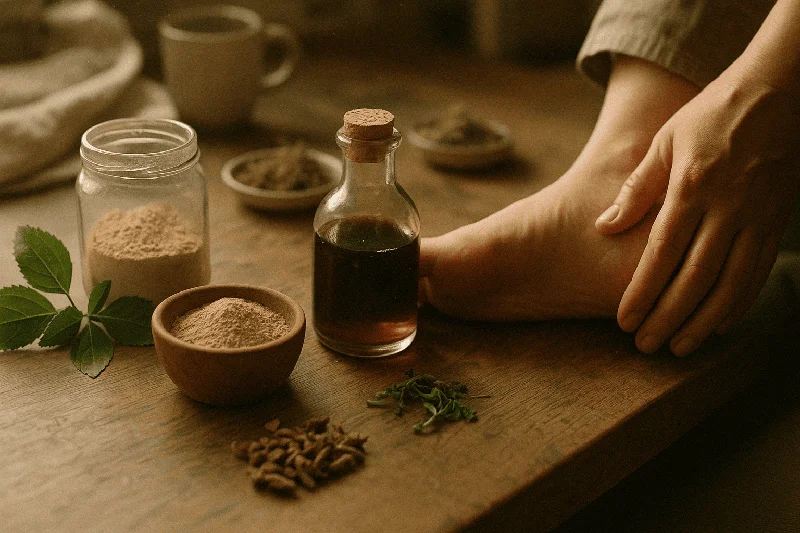Ask Ayurvedic doctor a question and get a consultation online on the problem of your concern in a free or paid mode. More than 2,000 experienced doctors work and wait for your questions on our site and help users to solve their health problems every day.
Ayurvedic Medicine for Heel Pain: Natural Relief for Lasting Comfort

Heel pain can be a debilitating condition that interferes with daily life and mobility. From plantar fasciitis to heel spurs, the causes of heel pain vary, but the discomfort often remains persistent. Ayurveda, the ancient Indian system of medicine, offers natural remedies to address heel pain at its root cause. With the use of Ayurvedic herbs, oils, and therapies, you can find relief without relying on synthetic painkillers. This article explores effective Ayurvedic medicine for heel pain, providing detailed insights into its benefits, uses, and application.
Common Causes of Heel Pain
Heel pain often arises due to excessive strain, injury, or underlying medical conditions. Some common causes include:
-
Plantar Fasciitis: Inflammation of the plantar fascia, a thick band of tissue connecting the heel bone to the toes.
-
Heel Spurs: Calcium deposits on the heel bone, often resulting from prolonged stress.
-
Achilles Tendinitis: Overuse or injury of the Achilles tendon.
-
Flat Feet or High Arches: Structural issues in the feet that strain the heels.
-
Arthritis: Inflammation in the joints, including the heel.
Don't wait or self medicate. Start chat with Doctor NOW
Ayurvedic Approach to Heel Pain
In Ayurveda, heel pain is often linked to an imbalance in the Vata dosha, which governs movement and circulation in the body. Excessive Vata can lead to dryness, stiffness, and pain in the joints and muscles. Ayurvedic treatments focus on restoring balance, reducing inflammation, and improving overall foot health.
Ayurvedic Remedies for Heel Pain
Here are some of the most effective Ayurvedic remedies for heel pain:
1. Dashmool
Dashmool, a blend of ten medicinal roots, is a powerful anti-inflammatory and analgesic remedy. It helps reduce swelling, improve circulation, and alleviate pain.
-
How to Use: Prepare a decoction of Dashmool and soak your feet in it for 15-20 minutes daily.
2. Ashwagandha
Ashwagandha is an adaptogenic herb that reduces stress and inflammation, promoting overall muscle and joint health.
-
How to Use: Consume Ashwagandha powder with warm milk twice a day or apply an Ashwagandha-based cream to the affected area.
3. Erand (Castor Oil)
Castor oil is an excellent natural remedy for reducing pain and inflammation in the heels.
-
How to Use: Warm castor oil and massage it gently onto the heel before bedtime. Cover your feet with socks to enhance absorption.
4. Guggulu
Guggulu is a potent anti-inflammatory herb that helps reduce heel pain caused by arthritis or other chronic conditions.
-
How to Use: Take Guggulu capsules or tablets as prescribed by an Ayurvedic practitioner.
5. Kumari (Aloe Vera)
Aloe vera has cooling and anti-inflammatory properties that provide relief from pain and swelling.
-
How to Use: Apply fresh aloe vera gel directly to the heel and leave it on for 20-30 minutes before washing off.
Ayurvedic Oils for Heel Pain Relief
Massage is an integral part of Ayurvedic treatment for heel pain. Here are some recommended oils:
-
Mahanarayan Oil: Rich in anti-inflammatory herbs, this oil relieves stiffness and improves circulation.
-
Massage warm Mahanarayan oil onto the heel twice daily.
-
-
Ksheerabala Oil: This oil nourishes tissues and reduces pain caused by Vata imbalances.
-
Use as part of a gentle foot massage before sleeping.
-
Foot Exercises in Ayurveda
Along with medicines and oils, Ayurveda emphasizes simple exercises to improve flexibility and reduce strain on the heels:
-
Toe Stretching: Stretch and curl your toes for 10 minutes daily.
-
Heel Raises: Stand on your toes and slowly lower your heels. Repeat 10-15 times.
-
Rolling Massage: Roll a tennis ball or wooden roller under your feet to relieve tension.
Dietary Recommendations for Heel Pain
A balanced diet is crucial for managing heel pain. Ayurvedic dietary tips include:
-
Warm and Nourishing Foods: Include soups, stews, and porridges to reduce Vata.
-
Anti-Inflammatory Spices: Turmeric, ginger, and black pepper help reduce pain and swelling.
-
Hydration: Drink warm water throughout the day to keep joints lubricated.
Precautions and When to See a Doctor
While Ayurvedic remedies are highly effective, it is essential to keep the following in mind:
-
Consultation: Always consult an Ayurvedic practitioner before starting any treatment.
-
Rest: Avoid overexerting your heels during the healing process.
-
Persistent Pain: If the pain persists for more than two weeks, seek medical advice.
Conclusion
Ayurvedic medicine for heel pain provides a holistic and natural approach to alleviating discomfort and improving foot health. From herbal remedies like Dashmool and Ashwagandha to therapeutic oils and dietary adjustments, Ayurveda offers a comprehensive solution to this common ailment.
By incorporating these Ayurvedic remedies and lifestyle changes, you can address heel pain effectively and restore balance to your body. For best results, always consult a qualified Ayurvedic practitioner to tailor the treatment to your needs.

